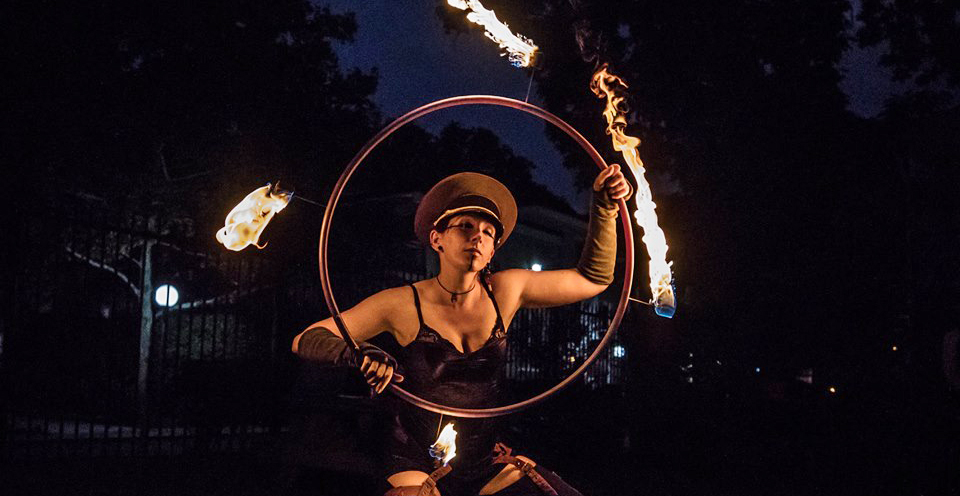Culture
 Photo: Tony Hitchcock Photography
Photo: Tony Hitchcock Photography
Fully Immersive Theatre: In Cabaret We Trust
September 25, 2017 @ 12:00am
As someone who has spent countless hours nestled safely in the audience during some of our city’s best theatre productions, the idea of being approached by an actor mid-performance and drawn into the plot is equal parts terrifying and intriguing. And those emotions are at least part of what artistic director Strother Gaines is gunning for with the brand new, completed-in-42-days, fully immersive In Cabaret We Trust.
At Blind Whino through this Thursday and Friday, and remounting in Dupont Underground this winter, the play follows a resistance cabaret (think burlesque dancers, sword swallowers, fire eaters, aerialists) in a populist-controlled republic run by an ultra-conservative lesbian senator. We caught up with Gaines about what inspired this production, how the story ties to our current political climate, and what audiences (and timid theatergoers like me) can expect and how they should prep for the experience. Read on for his thoughtful insight into the world of In Cabaret We Trust.
On Tap: How long has In Cabaret We Trust been in the works?
Strother Gaines: We started working on ICWT as a concept in October of 2016. This was our first stab at an immersive concept and we learned a ton from doing it. We knew right after the election that we had to put something out there, and we wanted to do it rapidly. CulturalDC awarded us the grant with 42 days [until] the preview performance. We were probably 20 percent into the story/character arcs/concept, and we had to finish the remaining 80 percent in 42 days.
OT: Were you inspired by Sleep No More or other immersive theatre productions?
SG: Oh yeah, immersive work has just fascinated me from the first show I ever saw. I was in London in 2005 and saw Tropicana presented by The Shunt Collective, and it took place in an abandoned London Tube station. The show was super weird but I couldn’t get enough of it. Sleep No More is stunningly good, and while we hope to differentiate ourselves from that (no masks, even though we thought about it), it’s absolutely a source of inspiration.
OT: Tell me more about the parallels between our current political landscape and the Weimar Republic. Why did that era seem like the right fit for this production?
SG: Today, the Weimar Republic serves as a crucial reference for exploring the problems we face in this moment. Through the lens of this historical context, our production [explores] concepts of power and control, as well as resistance and creation. We encourage the audience to share in a dialogue that takes them out of their seats and into the cabaret. While we might find it uncomfortable to examine the sins of our past, there is merit in comparing these difficult moments in our history with the decisions we face for our future. Political movements come and go, but the triumph of the human spirit remains.
OT: What led to the decision to make the ultra-conservative senator controlling the city a lesbian? How does her role impact the story?
SG: Honestly, it was a move that was inspired by my mother. My mom is a conservative Trump supporter, and she kept sending me articles about one gay guy who supported Trump. Or, “Look, here’s a black lady who says we should respect the office.” I told her, “Mom, these one-off examples don’t prove that all gays or all African Americans support Trump – or that they should.” When you have minorities involved in anything, I think tokenism is an easy off ramp when people are striving for diversity. By holding up the senator as a lesbian, we hoped to mirror the “Look, we’ve got one of those!” mindset that we’re starting to see in faux attempts at diversity and inclusion.
OT: How many actors are in the production? How were they selected?
SG: In total, we’ve got about 45 performers. They don’t all go on every single night, but through some ridiculous scheduling and fluidity to the world we built, we get as many as we can each night. We were extraordinarily lucky to have so many amazing performers be able to cobble together a super flexible casting situation so beautifully.
OT: What makes Blind Whino the right venue for this production? How does it lend itself well to this type of experience?
SG: Blind Whino was chosen for us by the Space4 program. The two venues they had open for us were Blind Whino and The Dupont Underground, where we’ll remount in February. We requested Blind Whino because it [was] easier to create a more fluid experience in a space where people were free to go [in] multiple directions and inhabit different spaces. In the Dupont Underground, we’ll have to do a lot more building to create secret spaces, private rooms and a nonlinear experience. Now that we’ve got the experience of Blind Whino under our belt, we’re more equipped to turn a linear space into a nonlinear experience.
OT: Can you give us a sense of how the actors interact with the audience, and what role the audience plays?
SG: There are lots of ways you can interact with our performers ranging from a traditional “sit, watch, be entertained” to direct questioning and storytelling with individuals. Every character has a concept of what they want that night, who they want to talk to, what objectives they want to accomplish and, “Can I use audience members to help accomplish those objectives?” If you are willing to complete tasks, deliver goods, solve puzzles, or just engage authentically and ask questions/learn more, than you can control your night in so many ways. There’s no real “standard” way to interact, and every character in the show will treat people differently based on a variety of factors. We force you to choose a side and persona and based on what you choose, you’ll get a different interaction.
OT: Can audience members actually shift the narrative or outcome through their interactions?
SG: Absolutely. The ending is up to the audience, and their final decision will be influenced [by] who they interacted with leading up to the finale. What opinions have you formed about the characters and what information do you know about each one?
OT: Any tips for theatergoers to fully enjoy the experience?
SG: Don’t stick with who you came with. It’s way more fun to go with a group and then discuss the different things you all found and discovered on your own. You’ll each get a very different experience and story, and you’ll collectively know more about the world than you would have if you’d both followed the same track. Don’t worry too much about FOMO, because there is no way you can experience it all. Yes, when you are watching the fire performers, you are missing the aerialists, the pregnancy reveal and the puzzle on the piano, but focus on what seems most appealing to you in that moment. Are you not excited by a scene? Leave and find something else. Know that you can’t see it all, and release the need to try for that before you even walk in the door.
OT: What do you hope audiences walk away with? How do you want them to feel?
SG: Our show tagline is, “May our joy be an act of resistance,” and we want people to walk away feeling excited, overwhelmed, maybe a bit confused, energized and like they want to come back to experience a new storyline next time. We hope that by making an experience unlike anything else in the DC area, that we leave our audiences feeling included and important. How you show up in the world of the cabaret directly affects what types of things you’ll experience, how people will react to you and ultimately how things shake out at the end. The same is true in the real world. If we’re passive, then things happen to us rather than because of us. I’d like people to own that they have control over what story gets told.
In Cabaret We Trust runs this Thursday, September 28 and Friday, September 29 at Blind Whino. Tickets are $45 for one, $80 for a pair. Learn more at www.culturaldc.org.
Blind Whino: 700 Delaware Ave. SW, DC; 202-554-0103; www.blindwhino.org







